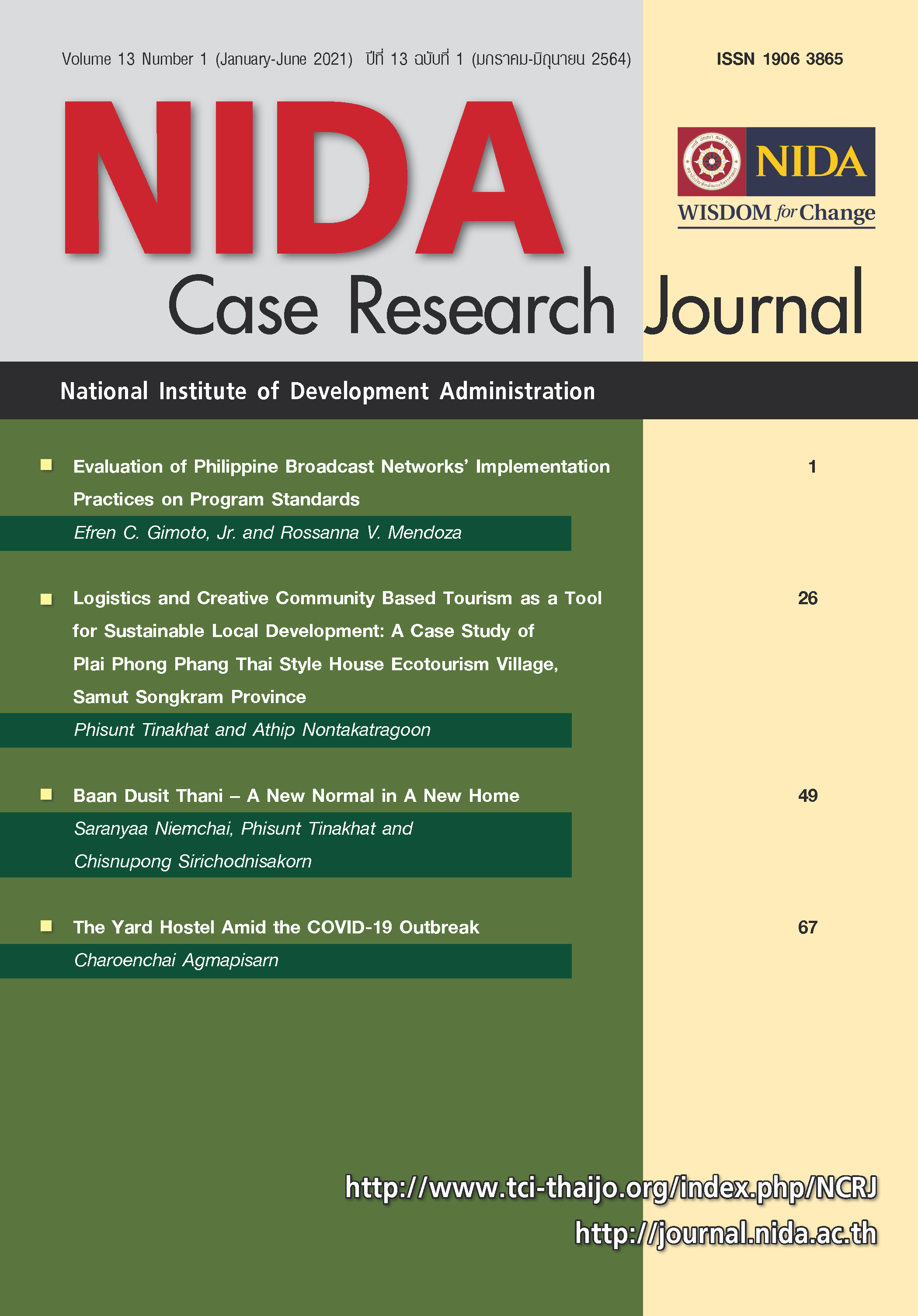Baan Dusit Thani – A New Normal in A New Home
Keywords:
New normal, COVID-19, Dusit Thani, Standalone restaurantAbstract
Baan Dusit Thani is located in Saladaeng area, in which is still the same area as the original Dusit Thani hotel’s location. It is a large ancient 100-year-old house called "Baan Sala Daeng" back to the pre-World War II. The owner of the house has preserved every corner of the traditional house carefully. Dusit Thani Group have considered bringing the popular restaurant of Dusit Thani Hotel to Baan Dusit Thani project, so that customers can still return and experience to use the same restaurant service. Restaurants that customers can use in Baan Dusit Thani are Benjarong Restaurant, Dusit Gourmet, Thien Duong Restaurant and also Dancing Hall, Pool Bar. Dusit Thani Group hope that Baan Dusit Thani will be a place to connect their existed customers to their new project that is being built.
Due to the impact of COVID-19, the newly opened Baan Dusit Thani has faced a lot of administrative problems. With the vision and hard work of the team, Baan Dusit Thani’s business has survived with the least impact. In addition, it is able to retain Dusit Thani staff employed. It is; therefore, very interesting to see how Baan Dusit Thai can adapt their business as a model to other businesses to survive with the least hurt.
References
Bancoro, A. I. M. (2020). Assessment of Work Integrated Learning: A Case of International Hotel and Resort Management Students of Dusit Thani College. Dusit Thani College Journal, 14(2), 575-589.
Bansiddhi, et al. (2019). Management factors affecting adrenal glucocorticoid activity of tourist camp elephants in Thailand and implications for elephant welfare. PloS one, 14(10), e0221537.
Chavarria, L. C. T., & Phakdee-auksorn, P. (2017). Understanding international tourists' attitudes towards street food in Phuket, Thailand. Tourism Management Perspectives, 21, 66-73.
Choonhavejsakul, A., & Na Pathum, S. (2019). The Affect of Creative Marketing and Content Advertising Strategy of Spending Behavior of South Korean Tourists’ Generation Y. Journal of Thai Hospitality and Tourism, 14(1), 42-57.
Chopthamdee, Y. (2019). The Relationship between Employee Engagement and Turnover Intention of Hotel Employees. Dusit Thani College Journal, 13(1), 380-388.
Kiatakarapol, U., & Chaipoopirutana, S. (2018). The Study of the Influencing Factors on Behavioral Intention toward Restaurant in Bangkok, Thailand. In 56. Kasetsart University Annual Conference, Bangkok (Thailand), 30 Jan-2 Feb 2018.
King, B., & Tang, C. M. F. (2020). Training Hotels in Asia: An Exploration of Alternative Models. Journal of Hospitality & Tourism Education, 32(1), 43-54.
Klongsungsorn, P., & Samphanwattanachai, B. (2019). Factors Affecting Thai Customers Decision Making to Choose Five-star Hotel along the River in Bangrak District, Bangkok. Dusit Thani College Journal, 13(2), 154-166.
Kvach, Y., Koval, V., & Hrymaliuk, A. (2018). Tourism and hospitalityindustryin the context of global economic development. Економіка. Екологія. Соціум, (2, вип. 4), 11-21.
Liu, Y., Li, Y., & Parkpian, P. (2018). Inbound tourism in Thailand: Market form and scale differentiation in ASEAN source countries. Tourism Management, 64, 22-36.
Muangasame, K., & Park, E. (2019). Food tourism, policy and sustainability: Behind the popularity of Thai food. In Food tourism in Asia (pp. 123-142). Springer, Singapore.
Nitivattananon, V., & Srinonil, S. (2019). Enhancing coastal areas governance for sustainable tourism in the context of urbanization and climate change in eastern Thailand.
Advances in Climate Change Research, 10(1), 47-58.
Ragmai, et al. (2019). The Development of Thai Food Recipes in Accordance with Dusit Thani College Standard: Appetizers and Desserts. Dusit Thani College Journal, 13(2), 184-199.
Srisakun, C. (2018). The Structural Equation Modeling of Organizational Climate Factors and Job Satisfaction Affecting Employee Engagement of Hotel Employees of Dusit International Group in Bangkok. WMS Journal of Management, 7(Special), 156-166.
Tangtatswas, R., Sornsaruht, A. P. D. P., & Pimdee, P. (2019). Fast-food restaurant customer satisfaction in Thailand: A structural equation model path analysis. African Journal of Hospitality, Tourism and Leisure, 8(5), 1-14.
Thosuwonchinda, V. (2017). Food activity uniqueness for creative tourism development: a case study Chiang Mai, Thailand.
Downloads
Published
How to Cite
Issue
Section
License
Copyright (c) 2022 NIDA Case Research Journal

This work is licensed under a Creative Commons Attribution-NonCommercial-NoDerivatives 4.0 International License.





